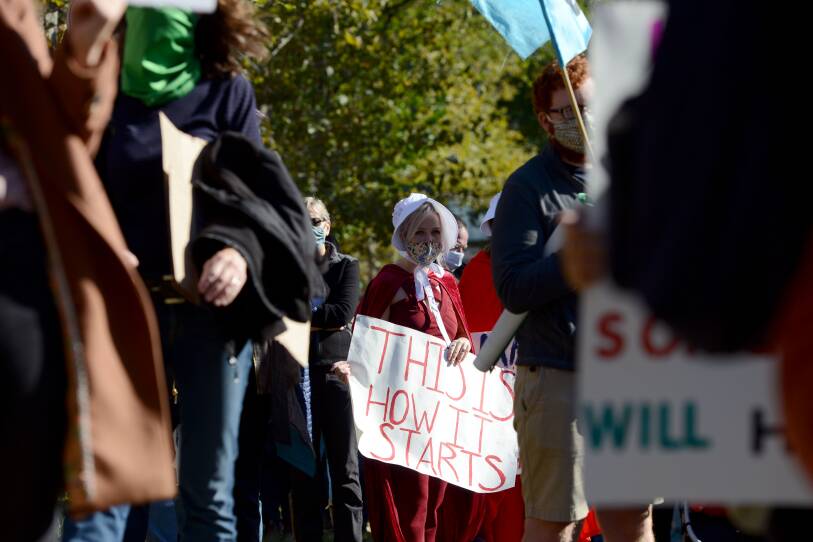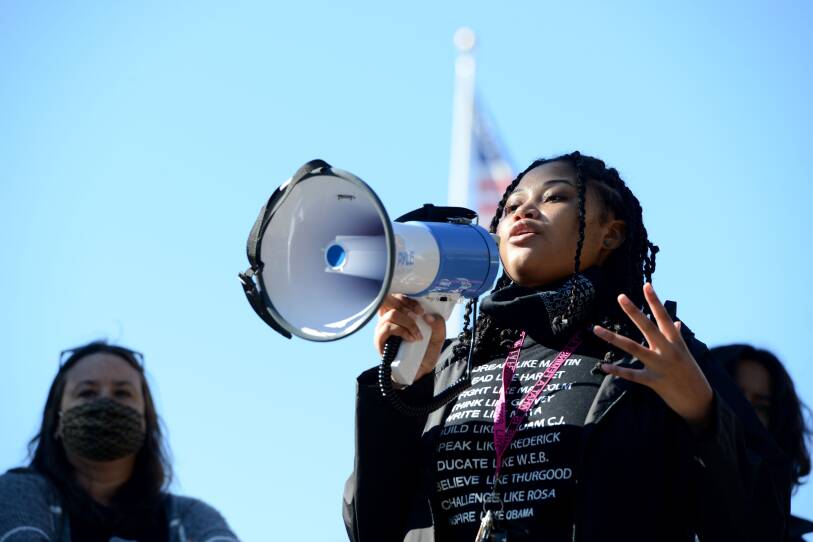Hundreds of people gathered on Boston Common Saturday to protest President Donald Trump’s nomination of Amy Coney Barrett to the Supreme Court, and to mobilize to vote the president out of office in November.
“We are here today to tell the temporary occupant of the White House that his sham of a nomination process is not supported by the American people,” said Siobhan Ready, who organized the march as part of the national Women's March group. The group stage protests nationwide Saturday.
Ready, a 21-year-old UMass Amherst political science student, said she wants to get more people involved politically to secure equal rights for women, people of color, those in the LGBTQ community, and other marginalized groups.
"We’re not going to allow the Trump administration to dictate who has equal rights and who doesn’t,” she said.
Some protesters donned black face masks with lace trim, a nod to the late Supreme Court Justice Ruth Bader Ginsburg, who came to be known for the lace collars she added to the traditionally male uniform of judicial robes.

Others, like Mariah Jacobsen, dressed as handmaids from the dystopian novel The Handmaid’s Tale, about a society in which women are completely subjugated to men.
“A lot is happening at once, and speculative fiction is becoming a lot less speculative,” said Jacobsen.
The Women's March movement grew out of massive protests the day after Trump’s 2017 inauguration, in response to his statements towards women, the fact that he had been accused of sexual assault, and his administration’s pledges to defund Planned Parenthood, repeal the Affordable Care Act, roll back environmental protections, and deport immigrants.
Now, as Trump nears the end of his first term — and on the first day of early voting in Massachusetts — those gathered in the Common on Saturday decried his steps to follow-through on those pledges, saying Barrett’s nomination to the court would threaten women's reproductive rights by overturning Roe v. Wade, and eliminating access to healthcare via the Affordable Care Act.
“We had elected a president who is really good, unfortunately, at keeping his promises,” to attack the Affordable Care Act and a woman's abortion rights, said State Rep. Lindsay Sabadosa from Northampton. “So here we are, four years after that first march we are back here, and we have to fulfill the promise that we made at that fist march, because we promised we were getting him out of office four years later.”
During her confirmation hearings, Barrett said repeatedly she is not “hostile” to the Affordable Care Act, but she has published writings in the past critiquing it; she said she would not act with an “agenda” on abortion, but in 2006 she added her name to a newspaper ad calling for an end to the “barbaric legacy of Roe v. Wade.”
Organizers demanded the Senate delay Barret's confirmation until after inauguration day 2021 and that every vote be counted before a victor is announced in the presidential election. The marchers also demanded Massachusetts pass the Roe Act, a bill designed to ensure state protections for abortion rights are not affected if Roe v. Wade is overturned.

Toiell Washington, 22-year-old co-founder of the group Black Boston, called on participants — the vast majority of whom were white women — to not forget Black women in their activism, as previous feminist movements have historically done.
"A lot of people here identify as feminist," she said. "i want you all to make sure when you say you're a feminist, you put intersectional feminist out there. I want you all to make sure that when we march, we're not just marching for reproductive rights and equal pay and maternal health, we're marching for our Black and brown sisters as well."




